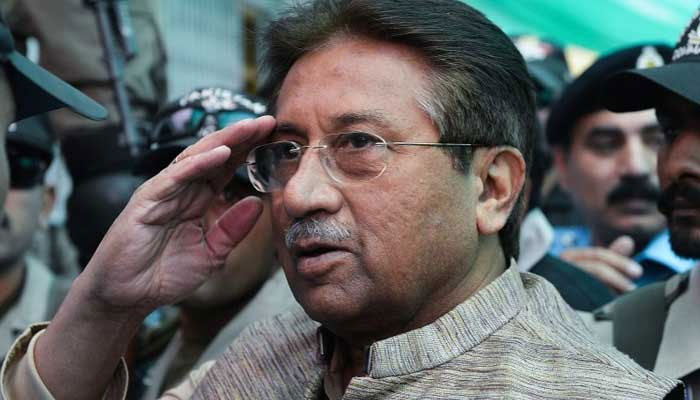Musharraf high treason case: Ruling without jurisdiction of court has no legal status, says SC
Supreme Court observed that a decision given without jurisdiction has not legal status
ISLAMABAD: The Supreme Court of Pakistan on Wednesday observed that a decision given without jurisdiction has not legal status.
A four-member larger bench of the apex court, headed by Chief Justice of Pakistan Qazi Faez Isa and comprising Justice Syed Mansoor Ali Shah, Justice Amin-ud-Din Khan and Justice Athar Minallah, heard an appeal of former military dictator not fixed for hearing since 2019 and other appeals challenging a verdict of the Lahore High Court declaring unconstitutional the formation of Special Court for trying Pervez Musharraf in a high treason case for imposing a state of emergency in 2007.
The court adjourned the hearing until November 28 with direction to Hamid Khan, counsel for the petitioner Taufeeq Asif, to submit written formulations. Justice Isa asked Hamid to confine his arguments to the extent of Lahore High Court judgment and not touch the merits of the high treason case, adding that by discussing the merits, the appeal filed against conviction in the high treason case could be affected. “How the trial conducted in the high treason case could be examined in the appeal,” the CJP remarked.
Hamid submitted that the petition had been filed with the Lahore High Court by Nazir Ahmed. However, the affidavit of Musharraf, who was not present in the country, was filed with the court after verification by Lahore oath commissioner Mian Muhammad Joya.
To a court query, Salman Safdar, counsel for Pervez Musharraf, told the court that his client went abroad on March 18, 2016. Justice Minallah asked the counsel as to whether Musharraf went abroad on court directions to which Safdar said he went abroad on the permission of the Sindh High Court after approval by the Supreme Court of Pakistan. Hamid contended that the Lahore High Court had no territorial jurisdiction, adding the Special Court was established in Islamabad. Hence the high court had no territorial jurisdiction while dealing with the petition. Despite territorial restrictions, the high court heard the petition and gave the decision, he said.
Justice Isa observed that the decision given without jurisdiction had no legal status, adding that a sessions judge could award death sentence to anyone but didn’t have direct jurisdiction over family matters-related cases.
“In the instant case under challenge, the Lahore High Court had no jurisdiction,” the CJP remarked. The chief justice questioned whether the high court had powers under Article 187 of the Constitution to provide complete justice. Hamid replied the Constitution had delegated this power only to the Supreme Court of Pakistan. “Then the question arises as to how the high court granted relief which was not sought,” the CJP remarked.
Justice Shah asked Hamid whether the high court had mentioned in the verdict how it invoked its jurisdiction while Justice Minallah asked whether the federal government that constituted the Special Court for trial of Musharraf had raised objections to the matter of jurisdiction. Hamid replied that the amicus curiae and all others were on the same page. The chief justice observed that it could be called a one-page theory.
The additional attorney general told the court that the Ministry of Law in its reply had raised objections to the jurisdiction matter of Lahore High Court. The chief justice observed the SC had accepted the Special Court, but the LHC declared its formation unconstitutional.
Meanwhile, the CJP said the court had granted one-week time to Salman Safdar for contacting the legal heirs of Musharraf and taking their instructions and that’s why the matter would be taken up next week.
-
 Kanye West Eyes Performing First-ever Concert In India
Kanye West Eyes Performing First-ever Concert In India -
 Brooklyn Beckham's Claim About Nicola's Wedding Ordeal Gets Challenged
Brooklyn Beckham's Claim About Nicola's Wedding Ordeal Gets Challenged -
 AI Horror: 4 In 5 Young Workers Fear 'AI Could Replace Their Jobs', Says Report
AI Horror: 4 In 5 Young Workers Fear 'AI Could Replace Their Jobs', Says Report -
 Missouri Couple ‘locked Sons In Chicken Pen, Shot Them’ In Shocking Abuse Case
Missouri Couple ‘locked Sons In Chicken Pen, Shot Them’ In Shocking Abuse Case -
 King Charles Receives 'delightful' Royal Baby News
King Charles Receives 'delightful' Royal Baby News -
 Chinese ‘mega Embassy’ Wins UK Approval In London Ahead Of Starmer’s China Visit
Chinese ‘mega Embassy’ Wins UK Approval In London Ahead Of Starmer’s China Visit -
 David Beckham Gives Telling Reaction To Brooklyn’s Public Complaints
David Beckham Gives Telling Reaction To Brooklyn’s Public Complaints -
 Can Ibuprofen Cut Cancer Risks? Study Finds Promising Breakthrough
Can Ibuprofen Cut Cancer Risks? Study Finds Promising Breakthrough -
 Piers Morgan Finally Reacts To Brooklyn Beckham's Statement About David And Victoria Beckham
Piers Morgan Finally Reacts To Brooklyn Beckham's Statement About David And Victoria Beckham -
 Tom Hiddleston Reveals Unlikely DC Character That Inspired Loki
Tom Hiddleston Reveals Unlikely DC Character That Inspired Loki -
 Prince Harry, Meghan Markle Warned 2026 Will Be 'a Big Test' For Them
Prince Harry, Meghan Markle Warned 2026 Will Be 'a Big Test' For Them -
 OpenAI Plans First ChatGPT Device For 2026
OpenAI Plans First ChatGPT Device For 2026 -
 Matt Damon Gets Slammed Over 'out Of Touch' Comparison
Matt Damon Gets Slammed Over 'out Of Touch' Comparison -
 From Chagos Islands To Greenland Trump Flags National Security Risks: Here’s Why
From Chagos Islands To Greenland Trump Flags National Security Risks: Here’s Why -
 Meghan’s UK Return As ‘successful Businesswoman’ Will Put Pressure On Kate Middleton
Meghan’s UK Return As ‘successful Businesswoman’ Will Put Pressure On Kate Middleton -
 Spotify Tests Page Match To Sync Books With Audiobooks
Spotify Tests Page Match To Sync Books With Audiobooks




